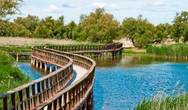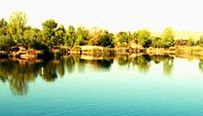Since its inception, our lab has been very interested on the long-term observations of ecosystem functioning and in the study of biogeochemical processes and ecosystem compartments using complex field experimentation as well.
Biogeochemical processes reshape ecosystem structure and function, and the response to often unpredictable factors need to be addressed under a time frame long enough to be able to quantify any observed trend. The long-term ecological study is key to understand how ecosystems and processes respond to environmental factors, including all human impacts (global change, pollution, land use and degradation and so forth).
On the other hand, experimental field sites offer opportunities to study how biogeochemical processes and interactions respond when exposed to some critical variables, such as elevated atmospheric carbon dioxide, temperature, ultraviolet radiation, ozone, etc. These experimental sites are key to foresee what the ecosystems will be in the next future, when the environmental conditions will be very different from the current ones and, probably, irreversibles. The aim of these environmental research infrastructures must be to provide convenient access to researchers in order to conduct research for the advancement of knowledge and technology: "sites and experimental platforms of anthropogenic impacts for ecosystem functioning and biodiversity research (Integrating Activities for Advanced Communities- European Research Infrastructures-H2020-INFRAIA-2018-2020).
Below you can look up information on LTER and experimental sites which are maintained and supported by our lab.
Biogeochemical processes reshape ecosystem structure and function, and the response to often unpredictable factors need to be addressed under a time frame long enough to be able to quantify any observed trend. The long-term ecological study is key to understand how ecosystems and processes respond to environmental factors, including all human impacts (global change, pollution, land use and degradation and so forth).
On the other hand, experimental field sites offer opportunities to study how biogeochemical processes and interactions respond when exposed to some critical variables, such as elevated atmospheric carbon dioxide, temperature, ultraviolet radiation, ozone, etc. These experimental sites are key to foresee what the ecosystems will be in the next future, when the environmental conditions will be very different from the current ones and, probably, irreversibles. The aim of these environmental research infrastructures must be to provide convenient access to researchers in order to conduct research for the advancement of knowledge and technology: "sites and experimental platforms of anthropogenic impacts for ecosystem functioning and biodiversity research (Integrating Activities for Advanced Communities- European Research Infrastructures-H2020-INFRAIA-2018-2020).
Below you can look up information on LTER and experimental sites which are maintained and supported by our lab.


